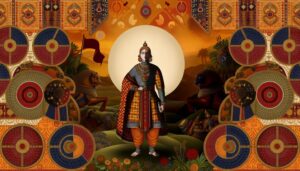Krishna Name Meaning in Hindi
In Hindi, the name Krishna, derived from ancient Sanskrit, means 'dark' or 'black.' This symbolizes the divine nature and the infinite mysteries of the universe. Krishna is a central figure in texts like the Mahabharata and the Bhagavad Gita, where he embodies strategic wisdom, compassion, and playful innocence.
Celebrated during festivals like Janmashtami and Holi, Krishna's name captures the essence of attraction and magnetism. Through his teachings on dharma, karma, and bhakti, Krishna transcends boundaries, shaping Hindu philosophy and spirituality.
Explore further to understand how his name and stories impact culture and spirituality.

Key Takeaways
- कृष्ण (Krishna) का अर्थ 'काला' या 'अंधकार' होता है।
- यह नाम दिव्य स्वभाव और आकर्षण को दर्शाता है।
- कृष्ण नाम अनंत ब्रह्मांड की गहराइयों का प्रतीक है।
- महाभारत और भगवद गीता में कृष्ण का उल्लेख मिलता है।
- कृष्ण नाम का धार्मिक और सांस्कृतिक महत्व बहुत अधिक है।
Etymology of Krishna
The etymology of 'Krishna' is deeply rooted in ancient Sanskrit, where the name translates to 'dark' or 'black,' symbolizing the all-encompassing, infinite nature of the divine.
When you explore the cultural context, you'll find that darkness here doesn't imply negativity but rather the profound, unfathomable depths of the universe. This interpretation aligns with the Hindu view of Krishna as a deity embodying the cosmos and life's complexities.
Linguistically, 'Krishna' also conveys attraction and magnetism, qualities attributed to the deity's persona. This dual meaning enriches your understanding of how language and spirituality intertwine in Indian culture.
Historical Significance
When you explore the historical significance of Krishna, you'll find references to him in ancient texts like the Mahabharata and the Bhagavad Gita, highlighting his profound impact on Hindu philosophy.
Cultural celebrations such as Janmashtami and Holi provide a glimpse into how Krishna's life and teachings are woven into the fabric of Indian tradition.
Additionally, mythological stories, including his childhood in Vrindavan and his role in the Kurukshetra war, offer rich insights into his multifaceted character.
Ancient Texts Reference
Delving into ancient texts like the Mahabharata and Bhagavad Gita, you uncover the profound historical significance and multifaceted meanings of the name Krishna in Hindi culture. Krishna is not just a name; it represents a divine essence associated with joy, love, and compassion. The ami name definition in Hindi reflects these qualities, emphasizing the affectionate and nurturing aspects of the character, making it a popular choice in various contexts. As a central figure in Hindu mythology, Krishna’s stories continue to inspire countless generations, illustrating the importance of dharma anddevotion.
In the Mahabharata, Krishna is portrayed as a divine strategist and charioteer, guiding Arjuna through moral dilemmas.
In the Bhagavad Gita, Krishna's teachings emphasize dharma (duty), karma (action), and bhakti (devotion), highlighting his role as a spiritual guide.
The name Krishna, meaning 'dark' or 'black,' symbolizes the infinite and the unknown, reflecting his mysterious and all-encompassing nature.
Through these texts, you see how Krishna transcends mere mortal boundaries, embodying a divine essence that continues to influence and shape Hindu philosophy and spirituality.
Cultural Celebrations Overview
Exploring Krishna's multifaceted meanings in ancient texts sets the stage for understanding how these profound attributes are celebrated in various cultural festivities throughout India, each festival imbued with layers of historical significance and spiritual symbolism.
Janmashtami, marking Krishna's birth, involves fasting, singing, and reenactments of his life, underscoring his divine playfulness and protective nature.
Holi, the festival of colors, celebrates Krishna's mischievous spirit and his playful relationship with Radha, symbolizing love and joyous abandon.
In South India, Gokulashtami highlights Krishna's childhood with elaborate displays of his youthful exploits.
Each celebration not only honors Krishna's diverse roles but also fosters communal harmony, reflecting centuries-old traditions that continue to resonate deeply with devotees today.
Mythological Stories Insight
Mythological stories about Krishna provide profound insights into his complex character and the historical significance he holds in Hindu tradition. Krishna's tales aren't just narratives but are imbued with deep moral and philosophical teachings. His life exemplifies:
- Compassion and Love: Krishna's bond with Radha and the Gopis highlights unconditional love.
- Strategic Wisdom: His counsel to Arjuna in the Bhagavad Gita offers timeless wisdom.
- Playful Innocence: The childhood pranks, like stealing butter, show his endearing, human side.
- Divine Protector: His role in protecting the villagers from dangers, such as lifting Govardhan Hill.
Spiritual Connotations
The name Krishna carries profound spiritual connotations, symbolizing divine love, wisdom, and the eternal cosmic balance within Hinduism. When you think of Krishna, envision the ultimate essence of joy and compassion, transcending material existence.
His name evokes the principle of 'bhakti'—devotional love that connects the soul with the divine. Krishna's teachings emphasize selfless action (karma yoga) and the pursuit of righteousness (dharma).
In the cultural context, Krishna represents the harmonious interplay between the material and spiritual worlds. His life stories serve as allegories for deeper spiritual truths, guiding you toward inner peace and enlightenment.
Krishna in Hindu Scriptures
To truly understand Krishna's profound spiritual influence, you need to examine his portrayal in the Hindu scriptures, where his divine attributes and life events are meticulously chronicled. The Bhagavad Gita, Mahabharata, and various Puranas vividly illustrate Krishna's multifaceted persona. You'll find that each text offers unique insights into his character and teachings.
- Bhagavad Gita: Krishna's discourse to Arjuna, emphasizing duty and righteousness.
- Mahabharata: Chronicles his role in the epic battle of Kurukshetra.
- Srimad Bhagavatam: Details his childhood miracles and divine play (leelas).
- Vishnu Purana: Depicts his avatar as a protector and sustainer of the universe.
These texts collectively shape your understanding of Krishna's enduring legacy in Hinduism.
Cultural Impact
Krishna's influence permeates every layer of Indian culture. From artistic expressions and literature to daily rituals and festivals, his presence is unmistakable.
You've likely seen his stories vividly depicted in traditional paintings, dance forms like Kathak, and classical music. The epic Mahabharata and the Bhagavad Gita, where Krishna is central, shape moral and ethical frameworks.
In daily life, his playful and divine aspects inspire countless names, songs, and prayers. Festivals like Janmashtami celebrate his birth with fervent devotion, featuring fasting, singing, and reenactments of his life.
Krishna's multifaceted character, blending divinity and humanity, resonates deeply, making him an enduring symbol of love, wisdom, and joy in Indian culture.
Modern Usage
In today's context, you'll notice that the name Krishna remains a popular choice for newborns, reflecting its deep-rooted cultural significance.
It's not just a name but a symbol of divine love and wisdom, resonating with modern parents who seek to imbue their children's lives with these values.
Popular Baby Names
Diving into the world of popular baby names in modern usage, you'll notice that names rooted in cultural and religious significance, such as Krishna, continue to hold a timeless appeal. This trend reflects a desire to connect with heritage while giving children names that carry profound meanings.
Modern parents often lean towards names that are both meaningful and resonate with contemporary values.
- Krishna: Embodying divine qualities, it symbolizes love and wisdom.
- Arjun: Represents strength and valor, inspired by the epic Mahabharata.
- Sita: Known for her purity and devotion, derived from the Ramayana.
- Arya: A versatile name meaning noble, used for both boys and girls.
These choices highlight an enduring respect for traditional values amidst evolving naming conventions.
Cultural Significance Today
Amidst the backdrop of globalization and cultural exchange, the name Krishna has maintained its resonance, reflecting a deep-rooted cultural significance that transcends generations.
You'll find this name not only in religious texts but also in modern contexts such as art, music, and literature.
Krishna embodies ideals of love, wisdom, and heroism, making it a timeless choice for parents seeking meaningful names for their children.
In contemporary India, Krishna is celebrated through festivals like Janmashtami, which unite communities and preserve cultural heritage.
Additionally, the name's popularity in yoga and meditation practices globally underscores its universal appeal.
Symbolism and Iconography
As you explore the rich tapestry of Krishna's symbolism and iconography, you'll uncover a profound interplay of cultural, religious, and artistic elements that convey his divine essence and multifaceted personality.
Each symbol and artistic depiction has deep significance:
- Flute (Bansuri): Represents divine music, enchanting both humans and nature, symbolizing spiritual awakening.
- Peacock Feather: Adorns his crown, symbolizing beauty, nature, and cosmic responsibility.
- Blue Skin: Denotes his infinite and all-encompassing nature, embodying the vastness of the sky and sea.
- Butter (Makhan): Reflects his playful and mischievous childhood, but also signifies the soul's essence.
Conclusion
By understanding Krishna's name, you're embracing more than a word; you're diving into a rich tapestry of history, spirituality, and cultural depth.
You're connecting with ancient scriptures, engaging with timeless stories, and experiencing profound symbolism.
You're not just learning about a deity; you're participating in a living tradition.
You're not merely observing; you're embodying a legacy that continues to influence and inspire.
You're not just reading; you're becoming part of a timeless narrative.






